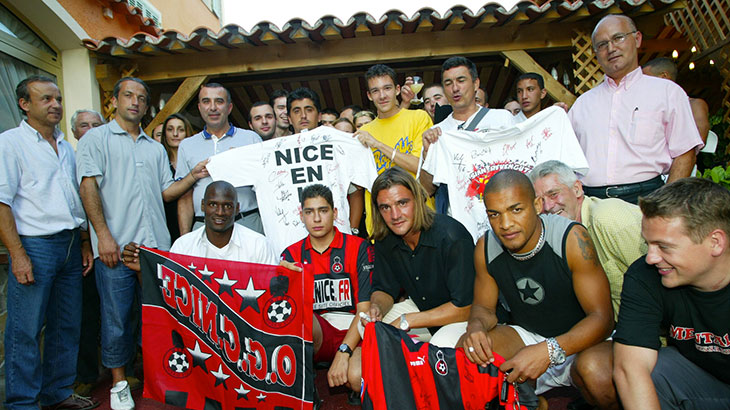
19 July 2002
The day when everything changed
Fifteen years to the day, the Gym won one of its biggest matches. Far from the pitch, Nice as a club was playing for survival on 19 July 2002. With an important role during this period, the “2nd father” of the youngsters at the club, Thierry Quoex (now in charge of boarding and the catering at the training ground) agreed to trace back over the steps of the day when everything changed. Without nostalgia, but with an ounce of romanticism, he tells of a time that the U15s can’t remember, but a day that the older ones could never forget.
“The Federal Council duly noted the observations of the National Directorate of Management Control (DNCG) of the Football League (LFP) and with the new information decided to keep Nice in L1.” The words came from the then-spokesman of the Fédération Française de Football (FFF) Jean-Yves Le Huedé. They continue to resonate in the head of every Nice supporter.
Passing from laughter to tears during the summer, the Niçois found their smiles once more on 19 July 2002. After having secured promotion to Ligue 1, the Gym had for a long period of the summer a sort of hangover. Demoted to the National by the DNCG, with the loss of professional status to boot, the club faced a long hellish plunge before being presented by a final glimmer of hope by the CNOSF (French National Olympic and Sports Committee).
“If we are going to die, we won’t do so lying down”
On 4 July 2002, a conference was held between the decision makers in Nice, the mediators from the CNOSF, as well as the leaders of the FFF in Paris. The Nice case was built around a group of investors (Gilbert Stellardo, Marcel Governatori, Maurice Cohen, Louis Bacchialoni and Jean Bessis), supported by Jean-Claude Perrin (lead by Luc Dayan), as well as the City of Nice who also put its hand in its pocket, and also the scrapping of the promotion bonus by the players was confirmed.
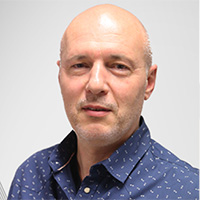 From their point of view, the fans had been mobilised for a couple of weeks. Each day, a real “crisis cell” headed up to the head office to move heaven and earth to inform members of the public of the situation.
From their point of view, the fans had been mobilised for a couple of weeks. Each day, a real “crisis cell” headed up to the head office to move heaven and earth to inform members of the public of the situation.
After the meeting, the mediators delivered a positive verdict. However, the mediators only had a consultative role, the final decision fell to the Federal Council of the FFF, who would meet in Lyon on 18 July.
With their passion as their only weapon, the supporters hoped to also influence the meeting, on-site. At the time, in charge of the shop of the CDS (Supporters’ Club), Thierry Quoex (photo) remembers: “We travelled up with four buses. The CDS and the Brigade assembled together. The truth, is that we didn’t fully believe it would happen. Our spirit was: if we are going to die, we aren’t going to do so lying down. It was like going to be part of the Resistance.”
Gathered in front of the Congress Centre, adjoining the Parc de la Tête d'Or, the supporters made their voices heard. A noisy last stand travelled around the place and even found its way into the meeting room. After the meeting, the rumour spread amongst the crowd: the Federation seemed to have followed the advice of the mediators.
“May justice be done”
The decision would only be communicated the day after, the famous 19 July. Whilst on their trip in Saint-Vallier, Cobos and his teammates welcomed the news by cracking open the champagne. A moment that Nice-Matin engraved in stone with the headline: “Justice is done.”
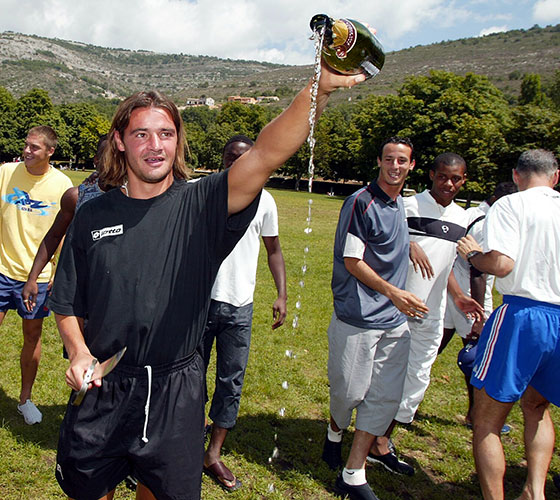
Freed from the chains of the DNCG, the club didn’t have the time to dwell on the decision: with just two weeks remaining ahead of the start of the championship, it had to put structures in place quickly, with limited means to do so. Quoex explained: “On the day of the decision, there was only Jean-Luc Bailet at the club, and two members of staff: Martine Rossi (Club Secretary) and Nicole Roussel (Accounts), who are still there today.”
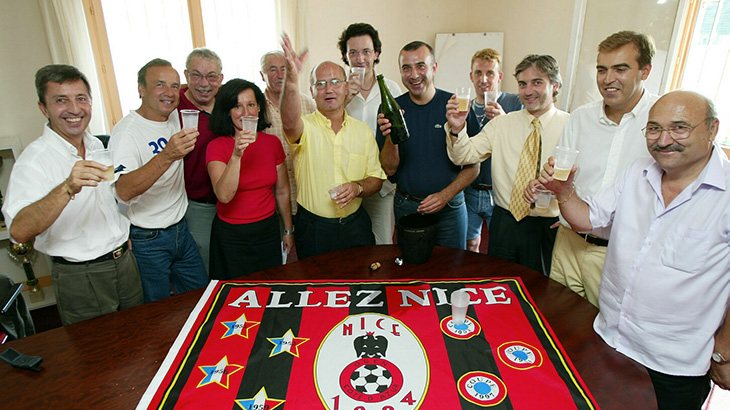
“A post-war feeling”
Under the leadership of Maurice Cohen, named President, OGC Nice took on the process of its restructuring. “As we remained under the control of the administrators, we couldn’t bring in temporary staff”, explained the man who was employed as Merchandising Manager - the man with everything to do: “Everybody had to muck in, regardless of the hours. There was a post-war feeling: nothing could hamper our good mood. Like the ’30 Glorieuses’, in a way.”
At the last minute, the club received its legendary ‘Maison de la literie’ shirts, as well as its training kits: “It was low quality stuff, just as you would expect to see at amateur clubs, smiled Quoex. The training kit was made of a heavy cotton. In two washes, it went from an XL to an M. That was the Gym.”
21 games on the podium
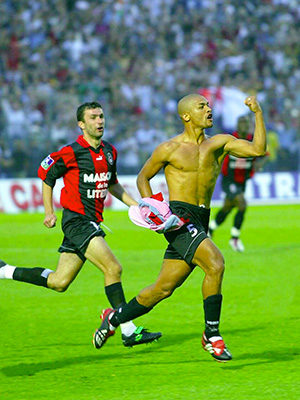 On the pitch, the club also reinforced itself: Kaba Diawara, Everson, "Pancho" Abardonado amongst others filled the dressing room, ready to (re)start their careers in red and black. “We took on some mercenaries who were ready to go out and fight, remembers Quoex. They had nothing to lose. As if they knew they were condemned from the get go, and that they let everything go that they could.” After an initial defeat against Le Havre (1-2), a hat-trick for Diawara and a goal for captain Cobos got Nice’s season going against Strasbourg (4-0). A victory at Lille (3-0) the week after saw them climb onto the podium. And they wouldn’t move from there until the 24th game of the season.
On the pitch, the club also reinforced itself: Kaba Diawara, Everson, "Pancho" Abardonado amongst others filled the dressing room, ready to (re)start their careers in red and black. “We took on some mercenaries who were ready to go out and fight, remembers Quoex. They had nothing to lose. As if they knew they were condemned from the get go, and that they let everything go that they could.” After an initial defeat against Le Havre (1-2), a hat-trick for Diawara and a goal for captain Cobos got Nice’s season going against Strasbourg (4-0). A victory at Lille (3-0) the week after saw them climb onto the podium. And they wouldn’t move from there until the 24th game of the season.
Driven on by the jubilation of its fans and their vengeful spirit, they frustrated all of the predictions about them. 10th at the end of the season, the players ensured the bet was worth it, and even secured a European adventure for the side’s fans.*
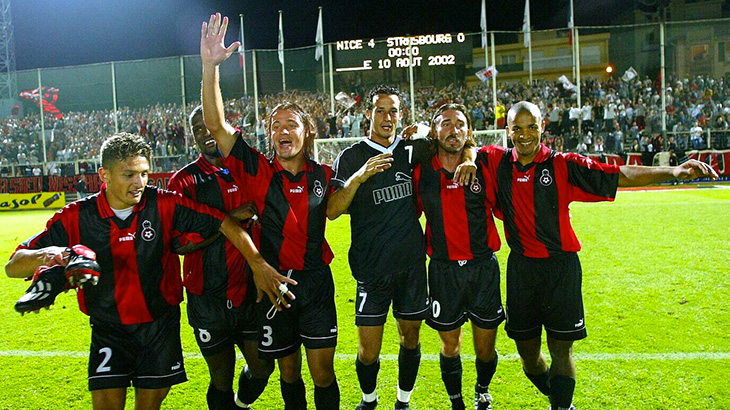
15 years later, the Gym are preparing to face the huge Ajax in the Q3 of the Champions League: “It’s great. It means that we didn’t fight in vain, beamed Quoex. At the time, I didn’t think we would manage it so quickly. We had struggled for so long during the previous 15 years…” Where would the Gym have ended up if things had gone differently back on 19 July 2002? “We would have managed to get out heads above water again on one day or another, believes Quoex. In the same way as Strasbourg, who are back in the top-flight this season, we are a real football city.”
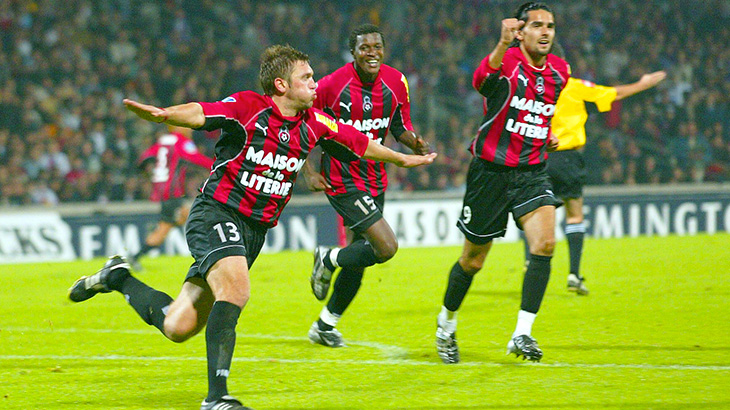
“Who is scared of the DNCG today?”
Like all of the experienced heads at the club, Thierry Quoex still carries the scars of that period: “On a human level, it stays as a good memory. What solidarity! But it wasn’t always easy. Looking back on it, it was maybe a blessing in disguise. We started from scratch in a lot of areas. At the time, Maurice Cohen (President) and Roger (Ricort, Sporting Director) made us all act with professionalism. And since they have arrived, Jean-Pierre Rivère (President) and Julien Fournier (Managing Director), have brought a stability that we had never had before. Now, who is scared of going in front of the DNCG?”
Even though the famous “Nice in L1” t-shirt is well stored away in boxes, Thierry Quoex admits: “There isn’t one day that goes by without thinking about this period. We can never forget where we come from.” Even though he speaks openly about it with the fans, the current Head of Boarding never talks about it to the youngsters at the academy: “I don’t want to come across as the “old idiot”. I prefer talking to them about the future.”
Fabien Hill
The Lens support
In its moment of need, the Gym received support from the four corners of France. Thierry Quoex even remembers “a letter from St-Etienne fans.” But the real support, came from the north of France, when the president of RC Lens Gervais Martel bought three academy graduates, finalists of the Gambardella in 2002 (Simon Feindouno, Jérôme Segreto and Pierre-Alexandre Mougeot): “They really helped us. Without that financial support, nothing would have been possible. We should never forget that.”
*The Aiglons took the place of RC Lens, recovered in the UEFA Cup thanks to Fair Play. After having knocked-out Orgryte (Sweden), they were beaten by Werder Bremen in the 3rd Qualifying Round (0-0 at the Ray, and a 1-0 defeat in Germany).


